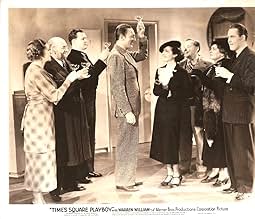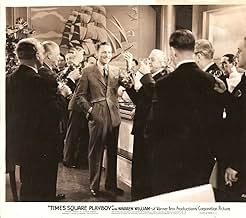A stock broker's best man thinks the bride-to-be and her family are just out for the groom's money, so he does everything he can to prevent the wedding.A stock broker's best man thinks the bride-to-be and her family are just out for the groom's money, so he does everything he can to prevent the wedding.A stock broker's best man thinks the bride-to-be and her family are just out for the groom's money, so he does everything he can to prevent the wedding.
- Director
- Writers
- Stars
George Beranger
- Jewelry Store Clerk
- (uncredited)
Ralph Brooks
- Nightclub Patron
- (uncredited)
James Conaty
- Board Member
- (uncredited)
Don Downen
- Billy
- (uncredited)
John Elliott
- Sam
- (uncredited)
Eddie Graham
- Club Bar Customer
- (uncredited)
Carol Hughes
- Phyllis
- (uncredited)
Mitchell Ingraham
- Calhoun's Servant
- (uncredited)
- Director
- Writers
- All cast & crew
- Production, box office & more at IMDbPro
Featured reviews
One critic wrote, "it's fifteen minutes for sure before there's an inkling of what the story's about." That's one of the elements that makes it so good: you can't figure it out. This is not formula, but a tightly written play from George M Cohan. The second scene has a clichéd conversation between two characters. Later, one player takes the chat and puts a totally negative spin on it. The other actors argue that everything he interpreted is opposite from the truth. This is like a good courtroom drama. Other elements that make it great are Gene Lockhart and Bart MacLane at their best. The comedy is funny, especially when Lockhart gets apoplectic. It has slapstick, and proves that a wrestling move taught in act 1 must be used in act 3. True screwball, the best of all movie genres.
Really ? The film I watched was about a girl, who gets accused of chasing a rich guy for his money! It's actually a remake of shakespeare's "much ado about nothing". Vic and beth are getting married, and they have invited old friend bancroft to be the best man. Things are over-heard, things are said. Misunderstandings galore, which happens when one is soused. (do they say that anymore?) can they all make up and straighten things out in time for the wedding? Warren william was the lone wolf and philo vance for years, in addition to so many roles in between. Co-stars gene lockhart and june travis. I don't know much about travis, but honestly, everyone else in the film talks about her character... travis doesn't really have many lines. Lockhart was oscar nominated for algiers. William died pretty young, but left a fun collection of films for us to enjoy. It's entertaining, but nothing real special. And they must have come up with the title over a three martini lunch... doesn't really have much to do with the story. This shows on turner classics.
Wall Street tycoon Warren William is engaged to nightclub singer June Travis, so his oldest friend from Big Bend Indiana, Gene Lockhart, comes to town with his wife Kathleen Lockhart, to be best man. But Lockhart -- Gene, not Kathleen -- is suspicious of Miss Travis, and her family, and her ex-boyfriend. He quarrels with William, then the wedding is called off.
It's an ensemble piece, but Lockhart gets a rare chance to be the de facto lead, and does a decent job in this second-feature remake of 1928 THE HOME TOWNERS. It was based on a George M. Cohan play and directed for speed by William McGann. Like many a Warner B of this period, it's adequate without being memorable.
It's an ensemble piece, but Lockhart gets a rare chance to be the de facto lead, and does a decent job in this second-feature remake of 1928 THE HOME TOWNERS. It was based on a George M. Cohan play and directed for speed by William McGann. Like many a Warner B of this period, it's adequate without being memorable.
Pitched about ten decibels too high as though that makes the lame material funnier, the shouted dialog from Vic (William) and Ban (Lockhart) had me reaching for earmuffs. That might be okay if there were enough comedy to relieve the aural assault. But there isn't. Then too the storyline is flat and repetitive, about a mix-up between Vic's best man Ban and his fiancee's family, putting them at loggerheads. Meanwhile, the mix-ups bounce around like pinballs with about that much credibility. The most interesting part is the mock wrestling between "butler" Casey (MacLane) and his uptown employer Vic. Seems Casey is also Vic's physical trainer, a good amusing touch. There's also a promising subplot of big city vs. small town that unfortunately goes under-developed. Fortunately, the movie does have the great Warren William—the main reason I tuned in. Plus, he gets a chance to play outside his usual high-class schemer roles. I'm just sorry that overall the material and direction add up to an over-the-top disappointment.
"Times Square Playboy" is a Depression era comedy about the high life of the well-to-do. One notices that the company that Victor Arnold heads is a stock and bonds firm. This film came out less than seven years after the Wall Street collapse (October 1929) that began the Great Depression worldwide. Perhaps Hollywood was trying to send a message that things were once again healthy, or well on the way to recovery.
It was during this decade that many movies were stories about wealthy people who seemed not to have been hurt by the stock market crash. They were living the good life, especially the good night life. And, the early days of sound pictures seemed to have a fascination for New York City, Broadway and Times Square. Did the movies originate or fuel the myth that every small-town girl dreamed of escaping to the big city?
Most of the people going to the "pictures" in 1936 were in the working class. One wonders what the different thoughts might be when, in this film, the male lead buys a $40,000 bracelet for his fiancé. That would be nearly $740,000 in 2019. The average household income in the U.S. in 1936 was barely $1,000, compared to about $60,000 in 2019. So, that one bracelet then amounted to nearly a lifetime of work for the average working person.
Anyway, this is a comedy that stars some well-known actors of the day. Warren William and Gene Lockhart were seasoned film actors before this, and though William has the male lead, Lockhart has the dominant role here, with more film time. Indeed, this movie seems to be a showcase for Gene, who uses it well with displays of a range of behaviors and moods. He is on the verge of a breakdown, angry to the point of exploding. He is suspicious and amiable, and then rueful and sorry.
Lockhart plays P.H. Bancroft, a long-time best friend of Arnold's. His wife in real life, Kathleen Lockhart, plays his wife here. Lottie Bancroft has her fair share of screen time for some quality acting as well. The Arnold part is rather small for William, who usually had substantial leads. Of course, his physical workouts here detract from the acting, but look quite good as he wrestles, runs and does other workout routines with his butler, Casey (played by Barton MacLane). This reminds me of another comedy, "Hard to Get" of 1938 that stars Dick Powell and Olivia de Havilland. Charles Winninger plays her wealthy dad, Ben Richards, who has an array of physical asides with his valet and right hand man, Case, played by Melville Cooper.
The rest of the cast are fine. The screenplay seems choppy in places, and the technical quality isn't very good. The plot is familiar but has a nice twist. The story is just so-so, but those who enjoy older films should find this one palatable. Those who are hooked on the adrenalin flows in many modern films will probably be bored.
It was during this decade that many movies were stories about wealthy people who seemed not to have been hurt by the stock market crash. They were living the good life, especially the good night life. And, the early days of sound pictures seemed to have a fascination for New York City, Broadway and Times Square. Did the movies originate or fuel the myth that every small-town girl dreamed of escaping to the big city?
Most of the people going to the "pictures" in 1936 were in the working class. One wonders what the different thoughts might be when, in this film, the male lead buys a $40,000 bracelet for his fiancé. That would be nearly $740,000 in 2019. The average household income in the U.S. in 1936 was barely $1,000, compared to about $60,000 in 2019. So, that one bracelet then amounted to nearly a lifetime of work for the average working person.
Anyway, this is a comedy that stars some well-known actors of the day. Warren William and Gene Lockhart were seasoned film actors before this, and though William has the male lead, Lockhart has the dominant role here, with more film time. Indeed, this movie seems to be a showcase for Gene, who uses it well with displays of a range of behaviors and moods. He is on the verge of a breakdown, angry to the point of exploding. He is suspicious and amiable, and then rueful and sorry.
Lockhart plays P.H. Bancroft, a long-time best friend of Arnold's. His wife in real life, Kathleen Lockhart, plays his wife here. Lottie Bancroft has her fair share of screen time for some quality acting as well. The Arnold part is rather small for William, who usually had substantial leads. Of course, his physical workouts here detract from the acting, but look quite good as he wrestles, runs and does other workout routines with his butler, Casey (played by Barton MacLane). This reminds me of another comedy, "Hard to Get" of 1938 that stars Dick Powell and Olivia de Havilland. Charles Winninger plays her wealthy dad, Ben Richards, who has an array of physical asides with his valet and right hand man, Case, played by Melville Cooper.
The rest of the cast are fine. The screenplay seems choppy in places, and the technical quality isn't very good. The plot is familiar but has a nice twist. The story is just so-so, but those who enjoy older films should find this one palatable. Those who are hooked on the adrenalin flows in many modern films will probably be bored.
Did you know
- TriviaThe Times Square Playboy (1936) screenplay was based on the Broadway production of "The Home Towners" by stage legend George M. Cohan, which opened at the Hudson Theater on August 23, 1926 and ran for 64 performances.
Working titles were Broadway Playboy, The Gentleman from Big Bend and His Best Man. It was produced and distributed by Warner Bros. The film's art direction was by Esdras Hartley, and uncredited costume design by Orry-Kelly.
- GoofsCasey (Vic's butler/judo instructor) when the entire group is enjoying a toast with champagne, is the first to throw his glass at a door and have it shatter in celebration. When it hits, the floor beneath the door is already littered with broken glass.
- Quotes
P.H. Bancroft: Here's mud in your eye!
- ConnectionsFeatured in MsMojo: Top 10 Funniest Bloopers from Classic Hollywood Movies (2023)
- SoundtracksLooking for Trouble
(uncredited)
Music by M.K. Jerome
Lyrics by Joan Jasmyn
[Beth aka Fay Melody (June Travis) sings the song in her nightclub act]
Details
- Runtime
- 1h 2m(62 min)
- Color
- Sound mix
- Aspect ratio
- 1.37 : 1
Contribute to this page
Suggest an edit or add missing content
































